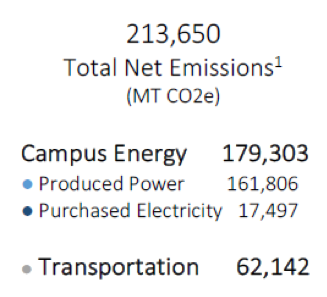Carbon-Neutral Cornell and Transportation
In response to the worldwide call for reducing carbon emissions, Cornell University has committed to carbon neutrality for the Ithaca campus by 2035.
Building upon the ongoing Climate Action Plan (CAP) and the Acceleration Working Group Report 2014 (pdf), Cornell’s Senior Leaders Climate Action Group (SLCAG) developed and analyzed a list of opportunities for achieving this target in the Options for Achieving a Carbon Neutral Campus by 2035 (OACNC) Analysis of Solutions Report (CNCEAR)(pdf) prepared by Facilities Engineering. Campus energy demand, supply, engagement, and transportation were identified as four major areas of concern. Implementation plans for the first three have begun, however the carbon footprint from transportation remains an issue to be addressed.
Cornell University is responsible for a carbon footprint of approximately 214,000 metric tons of C02 annually. 26% of C02 emissions are from transportation. [Figure 1] Cornell’s transportation related emissions can be divided into two major categories, commuting and business travel. Each of these categories contributes over 29,000 tons of C02-eq.


Figure 1. Cornell Ithaca Campus 2014 Greenhouse Gas Inventory
[Options for Achieving a Carbon Neutral Campus by 2035 (OACNC) Analysis of Solutions Report (CNCEAR) (pdf)]
CTECH Living Lab for Mobility Innovation
CTECH’s core mission of education, research, and outreach enables the Center to play a key role in this university-wide initiative. CTECH faculty, students and staff are collaborating with various university units and community partners (e.g. Cornell’s Senior Leaders Climate Action Group, Transportation and Mail Services, Campus Sustainability Office, Tompkins County Area Transit (TCAT), Ithaca Metropolitan Planning Organization, etc.) to use Cornell/Ithaca as a living lab for transportation innovation towards a carbon-neutral campus and community. Our approaches include, but are not limited to:
- Alternative vehicle options;
- Alternative fuel/energy sources and technologies for transportation;
- Multimodal, easy, electric transit and mobility-on-demand service; and
- Information for better-informed decisions for both users as well as service providers.
Using the principles of the Six Sigma approach, for example, student teams have worked with Cornell Facilities Services and Transportation and Mail Services to analyze the challenges and potential risks associated with efforts deployed by Cornell Transportation toward achieving carbon-neutrality, as well as potential solutions to mitigate and/or respond to these risks.
Cornell farm tractor gets clean, green biodiesel makeover
As Jared Hibshman ’19 helped to set up the project last year, members of the Engineers for a Sustainable World group – Gregory Brumberg ’21, Lawrence Li ’21, Sophia Openshaw ’23, Sai Mallipedhi ’21 and Ian Starnes ’20 – spent the first weekend in March converting the 2005 John Deere 6715 tractor in the Farm Service Shop, operated by Cornell’s College of Agriculture and Life Sciences, and Cornell’s Ithaca Agricultural Experiment Station. The tractor is used in the university’s compost operation and for agricultural research support.
The biodiesel tank and its fuel-switching kit – called the Vector System – was developed by Optimus Technologies, a Pittsburgh startup that makes biodiesel conversion systems for medium- and heavy-duty trucks. This was the company’s first conversion of a tractor; Jonathan Ewing, Optimus’ engineering manager, joined the students to supervise the system’s installation.
Biodiesel fuel can gel or solidify in cold weather, but the Vector System is designed to reduce the problem. The engine starts with traditional diesel, and as the engine warms, heat is delivered via the coolant system to the biodiesel fuel in a separate tank. The engine will automatically switch from diesel to biodiesel, once this renewable fuel reaches a specified temperature.
CTECH Transportation Workshop
Cornell’s 2017 Campus Sustainability Leadership Summit
CTECH’s living lab initiative in mobility innovation is working towards a carbon-neutral Cornell. Student teams presented on projects related to the future of alternative transportation and low-carbon solutions, electric vehicles and more (see below for full agenda).
Student Project Presentations
- Jared Hibshman, CTECH Living Laboratory Student Project Coordinator
Why Target Transportation? (pdf) - Gregory Brumberg and Manisha Kunala of Engineers for a Sustainable World: Biofuels Biodiesel Engine Feasibility Project (pdf)
- Srajal Raizada, Apurti Marodia, Srajan Shetty, Bakulesh Singh, and Simon Yu
Electrifying Cornell Fleet (pdf) - Nilesh Deshpande, Ye Lin Kim, JD Paff, and Daniel Sachs
Electrical Vehicle Charging Stations (pdf) - Yue Wang
Optimization of Cornell EV Rental (pdf) - Zelin Linghu, Yingqing Chen, Ran Gao, Siran Jia, and Chenxi Yang
Mini Electric Shuttle System (pdf) - Robert Gurnee
Simulation, Modeling, and Optimization Tools for Transit Network Design (pdf)

Student Team visiting the EV charging facility in Hoy Road Garage at Cornell University
CTECH Living Lab for Mobility Innovation Alliance
- Cornell Senior Leaders Climate Action Group
- Tompkins County Area Transit (TCAT)
- Transportation and Delivery Services, Infrastructure Properties and Planning, Cornell University